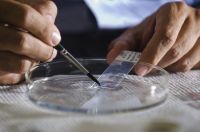UT System invests $30M to recruit nation’s top faculty to “Win the Talent War”
GALVESTON — Putting $5 million from an innovative University of Texas System program into the recruitment pot helped successfully recruit Bruce Beutler, M.D., from the prestigious Scripps Research Institute in California to join UT Southwestern’s faculty.
Not long after making the move, Beutler won the 2011 Nobel Prize in Physiology or Medicine, an honor he shared with two other scientists for their discoveries concerning the activation of innate immunity. He’s also brought UT Southwestern tens of millions in external research funding.
Drawing on the program’s success, The UT System Board of Regents today voted to approve another $30 million to recruit superstar entry-level faculty through the Rising STARs program as well as hire renowned senior faculty through the STARs program. The amount doubles the STARs budget from the $30 million approved by the Board last summer.
STARs aligns with Winning the Talent War — one of eight Quantum Leaps proposed by UT System Chancellor William H. McRaven in November as part of his vision to advance the UT System. Winning the Talent War is the System’s quest to bring world-class scholars, teachers and researchers to UT System institutions.
“In order to attract the best students and make research discoveries that improve the lives of Texans, we must be able to recruit the nation’s finest faculty,” McRaven said. “STARs has a proven track record of making UT System institutions a premiere destination for top academic talent.”
Since STARs was launched in 2004, the UT System’s cumulative investment of $178 million has yielded a return of $1.3 billion in external research funding; 6,264 scientific articles published; 200 patents; and five members of the National Academy of Science. That’s a return on investment of over $1.2 billion.
While STARs does not pay for faculty salaries, it does finance what researchers consider crucial to their work: laboratories with state-of-the-art equipment that is customized for their research specialties. The program sweetens the pot for talented faculty in the fields of health, science, technology, engineering and math.
David W. Russell, Ph.D., UT Southwestern’s vice provost and dean of basic research, said the institutions would not have been able to recruit Beutler and 24 other star faculty members from prestigious institutions such as New York University and Memorial Sloan Kettering Cancer Center without STARs.
“Most faculty stars that we make offers to have multiple offers,” Russell said. “The bigger the candidate, the more in demand they are. STARs enabled us to offer them generous start-up packages. The program has been indispensable to our ability to recruit.”
Dale Klein, Ph.D., UT System’s associate vice chancellor for research in academic affairs, said hiring renowned researchers elevates the UT System’s profile, which enables it to further attract talented faculty to the System’s academic campuses and help emerging research institutions achieve top-tier research status. UT Austin, already a Tier 1 research campus, has been very successful in the use of STARs funding.
“The quality of a university depends on its faculty,” Klein said.
Bruce Gnade, Ph.D., UT Dallas’ vice president for research, said STARs helped his university hire or retain 38 exceptional faculty members — some of whom have been lured away from schools such as the University of Illinois and University of Florida and national laboratories such as Sandia and Argonne.
“Most of the faculty we recruit already have a great position,” he said. “You have to convince them they can be even more successful at UT Dallas than they are in their current position.”
STARs recipients are selected through a competitive process administered by the UT System. Nominees are identified and recommended by university faculty groups before a System peer review committee vets the prospective recipients for selection in the program.
Some high-profile faculty members have reached out to UT System institutions for positions because of STARs.
Other notable STARs recruited are Russell Hulse, Ph.D. of UT Dallas, a co-winner of the Nobel Prize in Physics in 1993 for the discovery of the first binary pulsar; Richard Aldrich, Ph.D. of UT Austin, a recognized leader in neurobiology who was elected to the National Academy of Sciences in 2008; and Joseph Takahashi, Ph.D. of UT Southwestern, a neuroscientist and member of the National Academy of Sciences whose research has brought greater understanding of the molecular and genetic bases of circadian rhythms in mammals.
“No other university or system has a program quite like STARs, which has produced results that have exceeded our expectations,” said Patricia Hurn, Ph.D., UT System vice chancellor for health affairs.
About The University of Texas System
Educating students, providing care for patients, conducting groundbreaking basic, applied and clinical research, and serving the needs of Texans and the nation for more than 130 years, The University of Texas System is one of the largest public university systems in the United States. With 14 institutions and an enrollment of more than 217,000, the UT System confers more than one-third of the state’s undergraduate degrees, educates almost two-thirds of the state’s health care professionals annually and accounts for almost 70 percent of all research funds awarded to public institutions in Texas. The UT System has an annual operating budget of $16.9 billion (FY 2016) including $3 billion in sponsored programs funded by federal, state, local and private sources. With about 20,000 faculty – including Nobel laureates – and more than 70,000 health care professionals, researchers, student advisors and support staff, the UT System is one of the largest employers in the state.
News Contact Information
Ken Ma: kma@utsystem.edu • 512-499-4778 (direct) • 954-621-7961 (cell)
Jenny LaCoste-Caputo: jcaputo@utsystem.edu • 512-499-4361(direct) • 512-574-5777 (cell)


